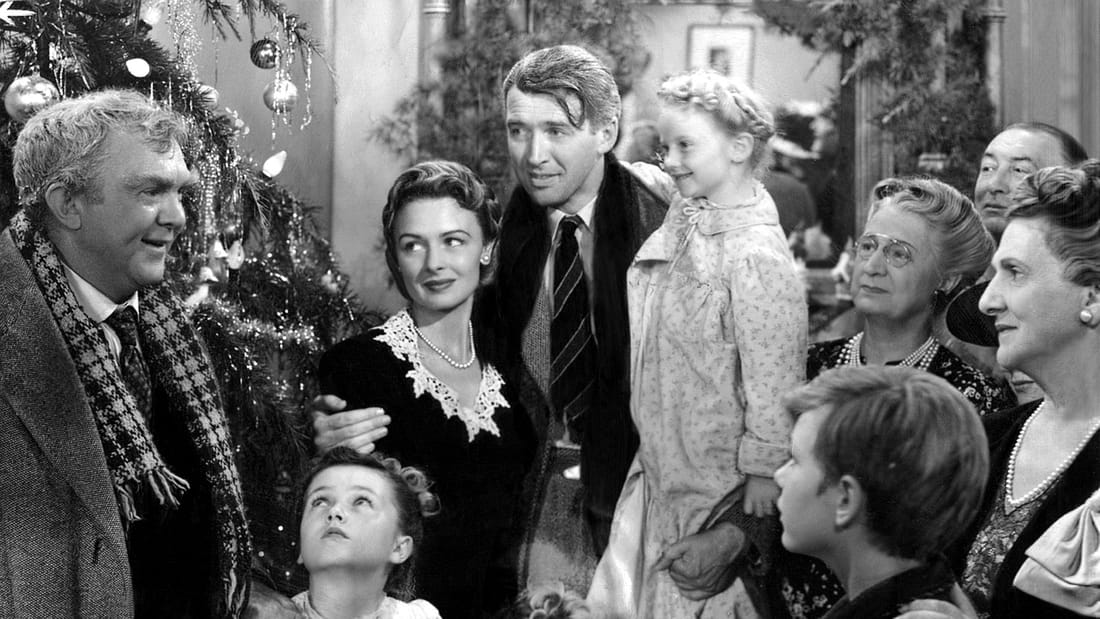|
I swear, nothing is "G". If It's a Wonderful Life can't earn a "G", I don't know what will. I guess the dude is suicidal. PG is still pretty good.
DIRECTOR: Frank Capra This is one of my favorite movies. I've seen it dozens of times. This might have been the test for how much I like this movie because my two-year-old son was jumping on my head for the majority of the tearful ending. It's really hard to see "No man is a failure who has friends" when my son was stomping my skull into the rug. Sorry about the spoiler. You should know this movie at this point and it should be beyond spoiling. I don't know what it is about Christmas movies that make me emotionally vulnerable. I preach vulnerability all day long in my classroom, but overall I'm a pretty cynical guy. I groan at the very notion of a Hallmark Channel, but Christmas is somewhat different. (I'm not cowtowing to Hallmark Channel's Christmas lineup. I will still groan at that. Sorry, the in-laws.) I mentioned that Shane Black always sets his movies at Christmas because the emotional stakes are higher and I kind of get that. As much as It's a Wonderful Life is the epitome of the Christmas movie, the movie really just kind of ends at Christmas. Again, as Black said, it's to raise the stakes of the whole affiar. There's no Santa in this movie. There is no recollection of the Nativity scene. It just happens to be set at Christmas because it makes everything all that much more important. (What I'm really saying is that Die Hard owes a lot to It's a Wonderful Life for establishing what makes a Christmas movie.) This is George Bailey's life and the premise that we all associate with It's a Wonderful Life is really almost a secondary thought. We have seen all the knockoffs of this plot. Every TV show that has an even mild science-fiction or fantasy element has done the story about "What if you had never been born?" storyline and we can thank Capra for it. But the reason that the original works so much better than the many followers that went beyond is the fact the story is about George Bailey as a whole human being. He is a good man in a bad situation. He is the everyman who always chooses the right and still gets punished for his good will. As a devout Catholic, I wish I was more motivated to lead the lives of the saints. As a film snob, I often look to George Bailey because he seems more tangible. That's a weirdly dark confession. Capra and Steward craft George Bailey in to a character who is not good for simply goodness sake, but because he genuinely deals with real temptations and is not the constant martyr. He has moments of happiness and moments of sadness. He is always so close to his dream and it is always taken away from him. In a bizarre way, Capra teases the audience with the goal. Placing George Bailey's story in a typical plot structure, his goal is to explore the world and to become an architect. He deserves this more than any character that I can think of because the goals are realistic and he is a good human being with a sense of responsibility. While some could see that the message could really be a tale of how one should settle rather than pursuing dreams, I think that cheapens the whole affair. George Bailey, rather than finding temporary happiness with the goals of a 13-year-old boy ("Hot dog!"), he finds long term happiness with the raising of a family and the people around him. Yeah, it's settling, but it is settling for a truer happiness than he probably would have received exploring the world. The message is also about the definition of greatness. Most kids are told "You could be the president", which in my more cynical views after the recent election, I realize isn't true. But that is the definition of greatness that most Americans are fed. I wonder if Capra's viewers as an immigrant reflect on this extreme view because he explains the greatness that comes from humility and service. Capra is either the greatest emotional manipulator ever or he's a man that really believes the themes he explores in his works. This is the ideal that we see in both Mr. Smith Goes to Washington and Meet John Doe. It comes from the greatness of people not viewing themselves as the final goal, but the community around them. Bailey is the self-sacrificing hero and he is rightly mad about it. But it is not only his character arc that changes, but those of the foils around him. Looking at the run on the bank, we see the worst that the depression had to offer. People looking out for their own self-interests. There's the guy who wants his $242.00 and no less and Bailey changes this man by the end. We have to assume that his contributions are not only saving George and his freedom, but he is also redeeming the sin on his soul. George Bailey is saved by Clarence and the town of Bedford Falls is saved by George Bailey. For a cynic, I have to say that this movie is a pretty solid moral compass.
0 Comments
Leave a Reply. |
Film is great. It can challenge us. It can entertain us. It can puzzle us. It can awaken us.
AuthorMr. H has watched an upsetting amount of movies. They bring him a level of joy that few things have achieved. Archives
July 2024
Categories |

 RSS Feed
RSS Feed